The Constant Gardener
Melinda Lopez Reflects on Her Mellon Residency and Repotting
Melinda Lopez developed her translation of Lorca’s Yerma as part of The Huntington Theatre Summer Workshops. She has also written and is in the early stages of developing and performing a one-woman play about the loss of her father.
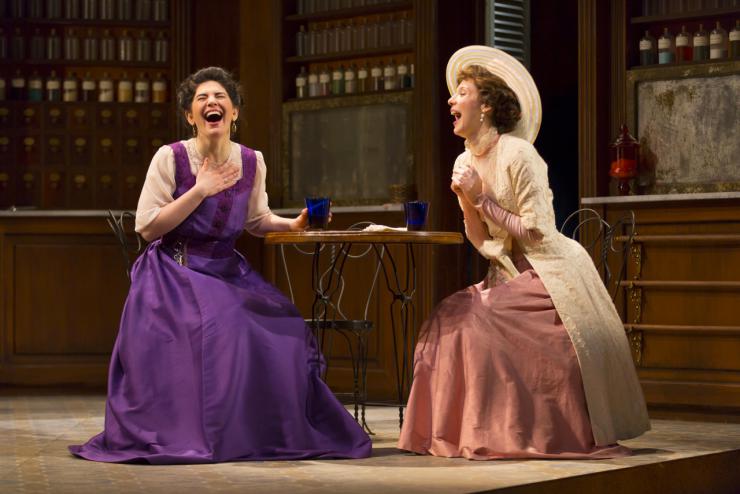
Miranda Craigwell: What were your impressions of developing your last play, Becoming Cuba, as part of the Huntington Theatre Company’s staff?
Melinda Lopez: It’s felt very natural and organic; I’m really lucky and blessed. Becoming Cuba had a significant amount of development. When the residency began, I got an office two doors down from the director of development, who would stop by and ask me about meeting with donors. Then, marketing would ask me where I thought they should reach out to find Cuban-Americans in Boston, or which restaurants I wanted to cater the opening night party. My director was up the hall, and she could run over with sketches or ideas. From the sacred to the profane, I cut through all the red tape of e-mail and texting. This was a wonderful way to incubate and go into rehearsals.
Now, I have hindsight because I’ve been in those artistic planning meetings when we’re talking about plays, and what’s going to be in the next season. I’m so glad I wasn’t part of the enormous and intense discussion of season planning when my play was on the table. I would have lost my mind. Having been through this process for other plays, I don’t know how anybody’s play gets picked, which is really sobering. Now when I think, “such and such theatre didn’t pick my play,” I know it probably has nothing to do with my play. When you’re a playwright and you’re waiting for a decision, the process of season selection is up in the air for so long. It’s extremely hard to wear those two hats.
When we started rehearsals for Becoming Cuba, The Huntington was careful to separate my life as a Fellow and my life as an “artist-in-production.” My director [Bevin O’Gara] fought hard to protect me from doing too much outside of the rehearsal room. The fact that I was a Fellow required someone standing up and saying, “You can’t have her as a Fellow because she’s a writer now.” And I’m not good at boundaries, so she was fierce about setting them. It’s nice to be taken care of that way. It prompted me to say, “You’re right. It is insane for me to be at a business breakfast the morning after our final preview!” The entire process helped me understand my responsibilities.
Miranda: Did you feel that the Huntington Theatre Company offices already had a creative pulse when you joined the staff?
Melinda: Oh yes, absolutely. The level of artistry involved in running a theatre is enormous, and a lot of the full time staff here are also artistic directors, directors, and designers in their own right. But there is also a divide with some staff that don’t really know your specific process as a playwright. Really, the creative process is not exciting or glamorous. It involves drinking coffee and writing a lot of bad material that gets cut, and that weird, mercurial moment when you get a great idea on the drive from home to the office, parking your car, or walking your dog. It’s hard to explain to people who have a spreadsheet with numbers on it. They want to see the numbers for creative work and I don’t have that for them. It’s important for an arts organization that is built on producing plays written by people—some who are living—to know what goes into that process, which doesn’t start in the rehearsal room. The Huntington is really great in that at every first read-through, the entire staff is invited to come that morning. Everyone is invited to have bagels and coffee. Everyone stands in a circle and introduces him or herself. That’s an incredible commitment to process—not product—and I think that’s why the Huntington is such a great fit for me.
In September, we had a cohort check-in with the other Mellon Fellow playwrights, where we talked about how our residencies were going now that we’re nearly half way through. And there was this interesting tension for us playwrights wanting to have all this freedom to come and go as we please, to be invisible, and fly under the radar. Yet, we also want to be at the table and to have a voice. That’s something that resonated with me. When you’re a writer, you’re creating your art, but as a theatre practitioner in the room, I can walk up to a major donor, shake his hand, and look him in the eye to say: “We’re both in the same world.” I’m just getting to that place. That probably has to do more with my personality and aesthetic so it doesn’t necessarily speak for any of the other resident playwrights out there, but there’s something great about having a foot in each world.
Miranda: How has having an office space as a resident playwright developed the creative and business sides of you?
Melinda: For a long time before the residency, I had been longing for a space that was mine and not in my house. I would fantasize about what warehouse or cubicle I could rent partly because having an office at home means that dirty dishes in the sink, or dust bunnies under the shelf become more interesting than writing. As a method of self-preservation, writers have to start thinking of ways to not clean out their refrigerators instead of writing. I wanted a space of my own for a long time, and then I got it. Now that I have it, I do find that the deep creative work—the profound thinking through an idea; the spark of inspiration that causes you to leave your bed at four AM to revisit a scene or monologue; or that piece of information you finally figured out how to use—still works best in my home. Whenever I come to the Huntington, there are many different ways I can use my artistic passion and get a lot of work done. But when I’m deep into writing a first draft, I need long spans of time. Sometimes an office isn’t the right place for that because it’s social. I hate to close my door when I’m here. But if I’m writing and the door is open I can’t finish what I’m writing. On the other hand, rewriting is something I can do here. There’s a different kind of thinking that takes place when I’m on Huntington Avenue. Work at the office tends to the analytical. It’s about structure and dramaturgy and research, but it’s just as valuable. And maybe I’ve learned that the chaos of dishes in the sink does add something to my creative work. It’s a mix.
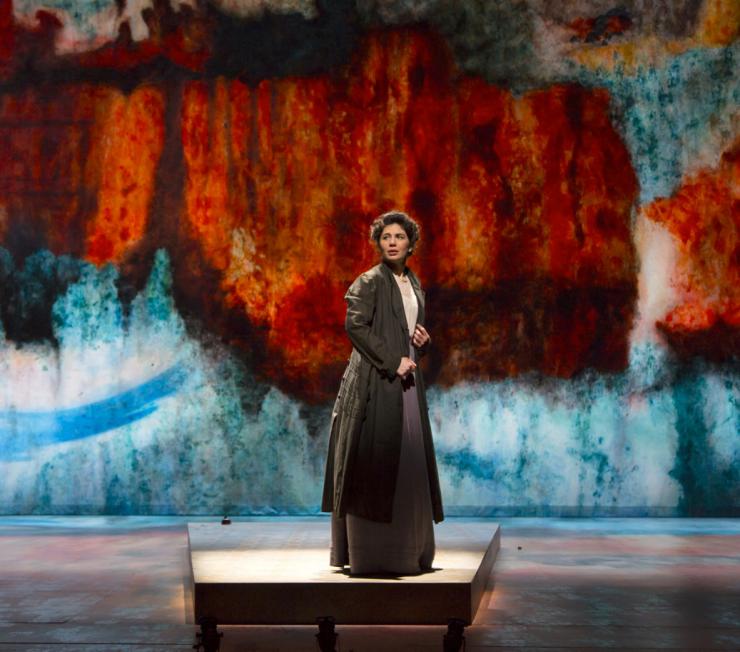
Repotting actually gives you space for the roots to grow. The tree is as big underneath as it is on top and I think what’s happening is the repotting of actors and my repotting as a playwright.
Creating space for Actors—The Actors Write Plays workshops
Miranda: Were there any difficulties involved in creating that space?
Melinda: I had this idea to do a playwriting class for actors. I geared it towards actors who were experienced on stage, but who had never written. I wanted to do it because I’m an actor and I know that actors understand how a play works. It was a theory of mine and I partnered with StageSource, an amazing organization in New England. They have a huge actor database to which we posted an open invitation for people to apply. We got about sixty applications for ten slots—and the difficulty was in selecting candidates—worst job ever to say ‘no’ to someone who is eager to write plays.
I don’t think anyone who is taking this workshop needs to be taught anything. They just need to be given an opportunity with someone with a stick who says, “Go write a scene. And bring it back or you’ll be punished.” OK, my teaching methods are subtler than that. They need a deadline and people they’re responsible to. We all need that. The thing I’m most proud of is that these actors have started writing and are now a community for each other. They’re calling each other when they have something new and when they want to read stuff. They trust each other. If nothing else, I’m proud of the part I’ve played in helping create those connections. We have an amazing community of artists in Boston, but we don’t have a lot of opportunity to take risks with each other that don’t involve being in front of an audience.
Miranda: Is there any way that you think “Actors write Plays” mimics “Theatres hire playwrights”?
Melinda: It’s like being repotted. Repotting actually gives you space for the roots to grow. The tree is as big underneath as it is on top and I think what’s happening is the repotting of actors and my repotting as a playwright. There are so many different kinds of theatres with different kinds of missions. It’s the same process as an actor picking up a moleskin journal and a pen, and then writing a scene. “So let’s start making theatre! How do we pay for this theatre? Where are we making theatre? For which communities are we making theatre?” If you continue to give people the experience of what playwriting means, it can lead to all sorts of repotting. This plant likes the sun while that plant likes the shade, and the other plant lives underwater. These different ecosystems are getting fed and getting exposure to this great thing—theatre.
Miranda: When work and personal spaces collide, Art is a space where the personal and professional can be indelibly intertwined. What are the stakes around those spaces for you?
Melinda: My mother died this year. My father died last year. My father-in-law just died—everyone’s dying. Why is it that everyone’s dying? Every day I think, “I have to write about this because it’s awful and funny.” But who wants to see that play? No one. That’s a terrible play. Maybe the process is writing the bad play so that I’m done with it. Then again, it’s the unfolding of where those ideas come from when my head is so full of the chaos of everyday life. While dealing with the loss of my father—a great man who should be in somebody’s play—there was a sense of finality that contrasted with the temporary nature of theatre. Both my parents didn’t get to see my last show, but for different reasons. So, it’s like who is it for? But then again, I know it’s for my daughter, my director, the acting community, the wigmakers, the designers, and this city. There’s an audience that knows my work and enjoys my work—God knows why—so, I know why I’m writing. It’s not to make my father happy. I talked earlier about feeling responsible to the theatre because I have an office with a door. I must work. I must be productive. I can’t, not work because I’m sad. And yet…my inner life is my work. It just is. And the paradox, especially at times of seismic life events—it’s hard. Many people lose their fathers and they go to work every day. They don’t have the luxury of saying in a whining voice, “I don’t feel creative.” Who gets to do that? Nobody gets to do that. I’m not at the point where I’m OK, but it does feel good to work and know that I’m uplifted by people I’ve made relationships with people who aren’t blood relatives, but they are my family.
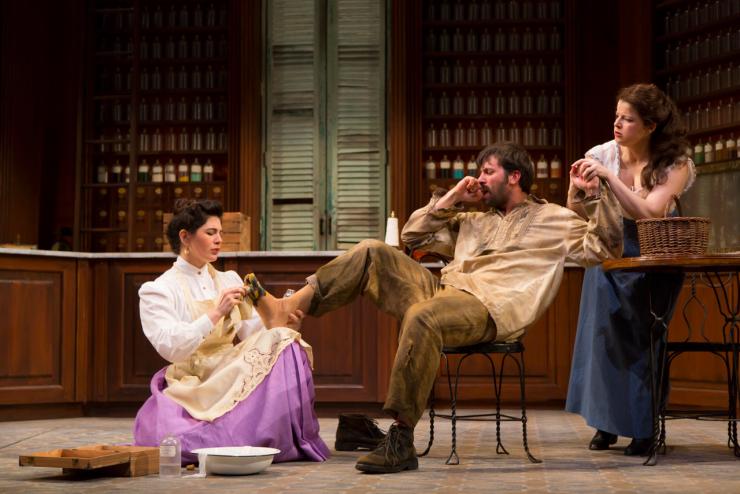
Miranda: How did having to be present in creative work feel?
Melinda: I love being in rehearsal is the place where I can focus so intently that nothing else exists. That’s such a blessing. I guess rock climbers experience that focus when they’re on a cliff. Usually people talk about experiencing an intense focus when they’re facing death, which is sort of like being in the rehearsal room. But it is time to focus on someone else, something else—making something. I think directing a workshop right after my father’s death was hugely beneficial. The writer called me saying he understood if I couldn’t do it and to take time for myself. I remember telling him that time for myself was the last thing I wanted. While going from that workshop to translating Yerma, I thought maybe there’s something in the process of denial that’s creatively fertile. I wrote the first draft of a new play very recently and quickly. I am excited that this play [Back the Night] has nothing to do with my father, grief, dying, sadness, or Cuban people. It’s very much outside my daily experience, but it’s mine. So, maybe there is something in the experience of grief that illuminated that for me, or maybe it’s a defense mechanism. I do know that sitting in a rehearsal room with a group of people making something together is a different experience than sitting in an office by yourself, combing through your father’s last night, and deciding if that’s something you’re ready to write about. Coal mining is hard. So are building bridges, and operating on people’s brains. Writing isn’t hard, but sometimes it is.
Addendum:
Melinda recently completed Mala, a one-woman comedy about dying. Mala will be in development with ArtsEmerson in 2016.


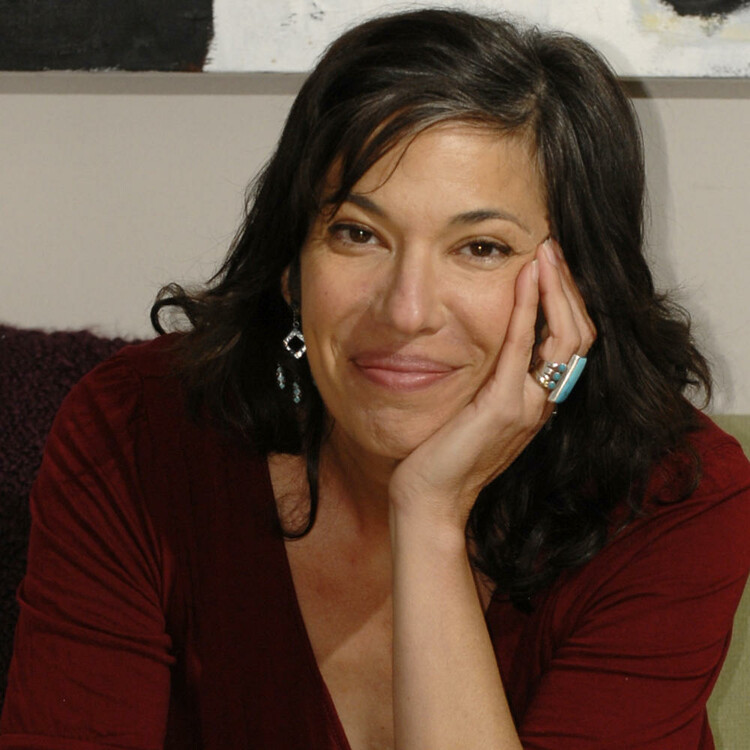



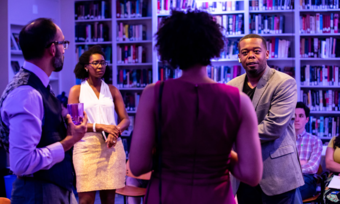


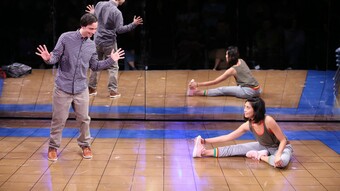


Comments
The article is just the start of the conversation—we want to know what you think about this subject, too! HowlRound is a space for knowledge-sharing, and we welcome spirited, thoughtful, and on-topic dialogue. Find our full comments policy here